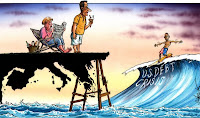With the Greek elections between the pro-EU New Democracy party and the anti-bailout party Syriza under way, one can`t stop and think about the critical importance of today`s events. The future of the European Union may well rest on the ballets in this small Mediterranean country that accounts for only 2% of the EU combined GDP. No matter the outcome, Greek households and corporations have switched to cash, stuffing the mattresses with euro bills, just in case the economy reverts to the drachma. Greece has become in the last months a cash economy.
Showing posts with label Greek bonds. Show all posts
Showing posts with label Greek bonds. Show all posts
Sunday, 17 June 2012
Monday, 21 May 2012
The Greek odyssey
Just like the legendary Greek warrior Achilles, at one point Greece seemed invulnerable: the country reported above the European average real GDP growth rates, relatively low budget deficits and stellar growth prospects. The figures ultimately proved deceitful: the budget deficit was adjusted to 12.5% of GDP in October 2009, in a time when the public debt was "only" 90% of GDP. It all went downhill from there.With credit spreads increasing, investors shunned Greek debt, prompting European banks to use cheap ECB credits to purchase more and more Greek bonds.
Labels:
ECB,
EU debt crisis,
FED,
Greek bonds,
Greek public debt,
IMF,
LTRO,
World Bank
Thursday, 9 February 2012
It`a all Greek to them!
The Greek tragi-comedy continues: an early agreement to secure an 130 billion euro rescue package from the Troika (the European Commission, the IMF and the European Central Bank) is getting less and probable. The officials failed to reach common ground on the sensitive issue of job cuts, lowering pensions and reducing the statutory minimum wage. IMF requests, or let`s say recommends Papadendreou to sack approximately 15,000 government employees and reduce primary pensions by nearly 20% in order to cut the budgetary deficit by 3 billion euro in 2012.
Monday, 16 January 2012
LTRO liquidity tsunami floods back to the ECB with little effect
The so-called Draghi put, more formally named "Long Term Refinancing Operation", through which the European Central Bank is offering almost unlimited liquidity with 3 years maturity at 1% yield, has proven unsuccessful at supporting the sovereign bond market. The big plan was that, by offering massive amounts of low cost financing to banks and financial institutions, they will park some of this excess cash into European debt instruments. Instead of this, it turns out that banks have chosen to deposit the funds back at the ECB and conduct small carry trades at the short end of the yield curves.
Thursday, 27 October 2011
Greek gentlemen, we have a deal ! Or do we ?
Talks on the third wave of financial aid for Greece have come to an end (finally), during last night's second crisis summit held in Brussels. The conclusion? Greek bondholders will accept a 50% haircut on Greek debt, while the EU will provide guarantees and collateral through the EFSF and will work on the recapitalization of European Banks. The "hot potato" question still remains? Who is going to provide the money for all this? The US, the IMF, China ?
Labels:
CDS,
EFSF,
EU debt,
Greek bonds,
Greek debt,
Greek GDP,
Hu Jintao,
IMF,
People's Bank of China,
Sarkozy,
US Fed
Monday, 24 October 2011
When the EU tsunami clears out the US debt crisis tidal wave will emerge
Nowadays the media are painting a bleak picture of the European Union debt crisis. The EFSF has been leveraged, the proposed "hair-cut" on Greek debt has been twisted and turned on all sides, without any visible conclusion. Contagion from the perypheral countries (PIGS) may spread out to the more stable countries: Germany and France (which is already on a credit downgrade outlook from Moody's). Meanwhile the US debt crisis tidal wave is closing by without anyone noticing.
Labels:
BOA Meryl Lynch,
CDS,
EFSF,
European Union,
France,
Germany,
Greek bonds,
Moody's,
PIGS,
SPIV,
US debt
Thursday, 20 October 2011
Is the EFSF going to save Greece ?
The yields on peripheral countries are getting higher and higher, reflecting worries about the high levels of debt and fiscal deficit within these countries (Portugal, Ireland, Greece and Spain). The 1 year Greek yield reached an apex of 188%. Just a year ago the yield on a 1 year Greek bonds was only 5%. The same goes for Portugal where the 1 year yields 18%, from 3.2% the 2010 figure. Ireland was partially saved by bond purchases and the yield stabilized to 8% after peaking at 22%. Will the EFSF cool-off the European debt crisis ?
Labels:
Default,
EFSF,
European Union,
Greece,
Greek bonds,
Greek yields,
Ireland,
Portugal,
Spain
While Greek yields skyrocket, the US continues its road to serfdom
The European Union may have done a very costly mistake by banning naked CDS shorts, because traders will now retort to outright shorting the underlying bonds. And short they will: Greek yields reached a staggering 188% for a 1yr note and they don't show any signs of cooling off. With Angela Merkel and Nicolas Sarkozy still undecided about the European Rescue Fund, things can only get worse. Meanwhile America continues its slow road to serfdom.
Labels:
CDS,
Debt/capita,
EFSF,
Eur/USD,
European Union,
France,
GDB/capita,
Germany,
Greece,
Greek bonds,
Greek yields,
IMF
Subscribe to:
Posts (Atom)








